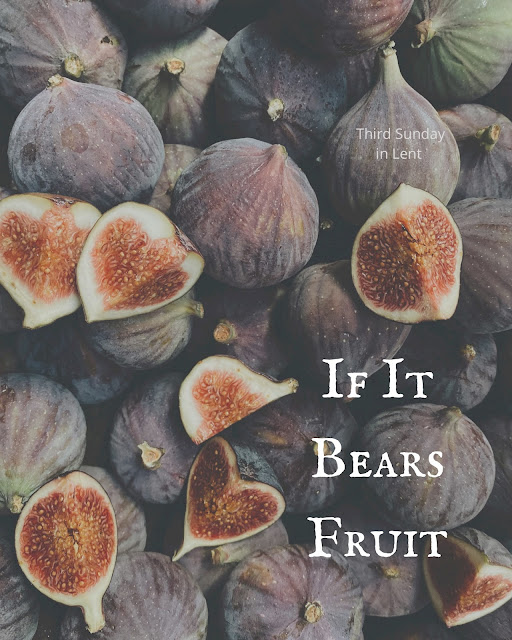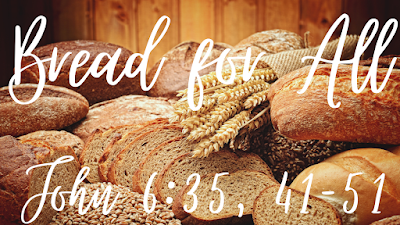If It Bears Fruit - Luke 13:1-9 (Lent 3C)
Throughout our Lenten season, we are reflecting, and hopefully, some of that time is sorting out what God wants from us. Maybe how to incorporate spiritual activities back into our lives if we fell out of practice. Perhaps it’s how to better use the spiritual gifts that God has given us. We want our lives to matter. This is an entirely human trait and can be traced back through time.
Not only does Jesus call us to live out our faith, but he wants to see spiritual fruit from those actions. Just like natural fruit, it's something that happens when we blossom through the faith process. You need to be mature to create fruit. A newly planted tree isn't strong enough to go through the process. It needs to develop root structures, and branch out. There many not be fruit on every single branch either. There's all sorts of fruit, but people have named whole trees after the one fruit that it produces, like apple trees, lemon trees, etc. Thankfully enough, God did not create us to bear only one type of fruit.
Before he talks about bearing fruit, there are a couple of things Jesus talks about first. He wants to talk about a couple of tragedies near where he was. Jesus also wants to make a point about sin. The first tragedy (from verse 1) was that Pilate commanded his soldiers to kill some people in Galilee. Let’s get into some context of that. This cruelty was only mentioned in the Gospel of Luke, and scholars think that it refers to Galileans. The latter were offering sacrifices at the Temple. Galilean Jews were also rivals of the Jerusalem Jews, so there may be a question be about So - they were killed in the church, and wasn’t Jesus OUTRAGED?? HOW DARE THAT PILATE??? I bet the crowd wanted Jesus to come to their side.
Listen to Jesus’ reply (from the Contemporary English Version): Do you think these people were worse sinners than EVERYONE ELSE in Galilee because of what happened to them? Not at all!… Wait - what did Jesus say? I mean - I know we are getting into that weird area of theodicy - or a big word for the idea why bad things happen to good people, something we talked about through the book of Job. But Jesus is saying, were those people the worst, did they deserve the wrath brought to them? And with mercy, Jesus concludes, probably without a pause, ABSOLUTELY NOT. But he brings up another tragedy… the tower at Siloam, which was part of an aqueduct that Pilate was building, collapsed, and 18 people died. Did this happen because those people were sinners being condemned for their sin? Jesus again says - ABSOLUTELY NOT. Jesus was asked about key political issues - what should we do about this injustice and these tragedies?
Jesus comes at it from a different angle - and maybe threw the listeners off, whoever they may have been. He says, repent, or you will die! Whoa… Jesus… this doesn’t seem like you - do you need a Snickers? We expect this kind of thing from John the Baptist, but you? You’re my cool guy who just wants to offer salvation and eternal life, right?
His point was that we can repent of our sins and get back into the right relationship with him at any point in God’s mercy. This doesn’t mean that we won’t die - but like in John 3:16, as long as we repent, we will be given everlasting life. Jesus rejects the idea that these people deserved their fate and were punished because of who they were. Much like what we learned from Job - tragedy happens, and it is not us humans who get to judge God because of it or deny his existence or faithfulness.
Repentance, though - that’s a heavy word. To be honest, repentance seems like one of those fire and brimstone words connected with damnation and disrespect of people’s humanity. The word in Greek is metanoia which is better translated as a “change of mind,” as in a turn of your internal character, your gut. This Greek word doesn’t include any sort of guilt or regret or of morals. The Common English Bible has a different translation, saying in verses 3 & 5, “No, I tell you, but unless you change your hearts and lives, you will die just as they did.”
So that’s the angle Jesus is coming at us with. To cement the story a little more, he tells the story of a fig tree. Fig trees are unique plants. I found out so much about them this week. First - did you know that a fig tree can intentionally not fruit? I mean - it’s not like the tree has a brain or anything - that’d be ABSURD - but the tree is fickle. Put it in the wrong soil, with the wrong amount of water, with too much pruning - it won’t blossom and produce fruit. Do you know who else is fickle? Humans. We put all these rules around our relationships, whether with God, or each other, or OURSELVES… that it’s no matter that humans aren’t as loving and caring as they could be.
Back to Jesus, though - so Jesus tells a story - or even possibly a riddle: The farmer had a fig tree. He’s watching his plant, and it’s doing NOTHING. Bupkus. No flowers; it seems like it’s dead. So - he talks to his guy, the gardener - this tree must be dead. I can’t do anything with it. It’s so stubborn. Chop it down; it’s not worth it anymore. I’m over it; get me another tree. But the gardener… shows mercy - to the tree! It must have been scary for the employee to talk to the owner like that. I don’t think labor relations were like that back in ancient times, but here we are! The gardener says, let me put in some extra work; I’ll get that tree turned around, and you’ll have fruit next year. But if it doesn’t - we will do it your way.
And that’s the end of the story. What?? Maybe it got lost with time, but there is no conclusion with the scriptures we have, so that’s why it kind of feels like a riddle! Which do you relate the most to? I can connect with the landowner because I have some seemingly dead trees in my backyard, and I just need to call a tree service and see what can be done with that. One thing is that I don’t want to be the fig tree. Although, after realizing that Jesus is pairing these stories together, it seems as though we are the fig trees, and God is the landowner, but then who is the gardener? Jesus. Jesus offers grace for when we feel the wrath of God breathing down our necks. In our failure to bear fruit, we can seem deserving to be cut down.
Christ also intercedes on our behalf, doing extra work to help us bear fruit. This is why we pray and offer our best and even praise him when we realize everything he has done. Daniel Deffenbaugh wrote, “the manure around our roots is the very blood of the one who pleads for our justification before God, the one through whom we may offer up the fruits of the Kingdom to our Creator.”
So how does this all get us to gather into Jesus? How can this be applied during Lent? We affirm that God’s grace is never something we can earn but can be accepted when we change our hearts to be in one with God’s will, loving him and loving our neighbor. Eternal life is what happens when we live in full relationship with not only God but ourselves and neighbors. Christ is the light and the example we must use to know how to live in that fullness. By following Christ, we can get closer to God’s intentions for his creation. But also remember sometimes that the wrath of God is as much of our own doing as it is of God’s.
This fig tree parable has been misused and misinterpreted over the centuries to support an idealized prosperity gospel: that the fig tree gets so much extra attention and care that it must be blessed.
But to turn that around - it’s because the tree is barren that it gets the extra attention and care. It gets grace because it is not performing. Jesus wants to help us be successful in making disciples. Wouldn’t he want to give us every advantage to do so? Which brings up more questions that may not be friendly. Are we willing to be faithful to creating disciples, or do we just want to minimize that message to make the gospel respectable or not inconvenient? Our mission as the United Methodist Church is to create disciples of Jesus Christ for the transformation of the world. But the ways that the world seems to be transforming do not seem to be more loving, more grace-filled, more fruitful.
It was common for people in Jesus’ time and earlier to believe that God controlled all things. So, if a person was killed, that person must have done something to deserve that act. Their theology did not take into account free will and the fact that bad things can come from people making bad choices. Jesus does not offer up an easy answer of why the people in this passage died but refutes that they were at all to blame. Jesus offers the people grace that the society was not.
Sometimes it can be easier to give up on a person or object because they / it is not performing as you wish. This parable extends mercy to those who need extra help to thrive. If the tree can thrive, providing it with a little extra time is good for the tree and the man. Showing mercy leads toward life.
But the Good News, friends, in front of us is when we recognize that we separate ourselves from either God or community, we can repent - turn ourselves around in mind and spirit - and walk toward the life God wants us to have. With Jesus' help, we can determine what the end of that story looks like.




Comments
Post a Comment